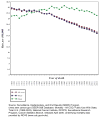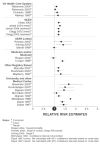African-American and Caucasian disparities in colorectal cancer mortality and survival by data source: an epidemiologic review
- PMID: 18048968
- PMCID: PMC2667694
- DOI: 10.3233/cbm-2007-3604
African-American and Caucasian disparities in colorectal cancer mortality and survival by data source: an epidemiologic review
Abstract
Over the past four decades in the United States, there has been a divergent trend in mortality rates between African-Americans and Caucasians with colorectal cancer (CRC). Rates among Caucasians have been steadily declining, whereas rates among African-Americans have only started a gradual decline in recent years. We reviewed epidemiologic studies of CRC racial disparities between African-Americans and Caucasians, including studies from SEER and population-based cancer registries, Veterans Affairs (VA) databases, healthcare coverage databases, and university and other medical center data sources. Elevated overall and stage-specific risks of CRC mortality and shorter survival for African-Americans compared with Caucasians were reported across all data sources. The magnitude of racial disparities varied across study groups, with the strongest associations observed in university and non-VA hospital-based medical center studies, while an attenuated discrepancy was found in VA database studies. An advanced stage of disease at the time of diagnosis among African-Americans is a major contributing factor to the racial disparity in survival. Several studies, however, have shown that an increased risk of CRC death among African-Americans remains even after controlling for tumor stage at diagnosis, socioeconomic factors, and co-morbidity. Despite advances in treatment, improvements in the standard of care, and increased screening options, racial differences persist in CRC mortality and survival. Therefore, continued research efforts are necessary to disentangle the clinical, social, biological, and environmental factors that constitute the racial disparity. In addition, results across data sources should be considered when evaluating racial differences in cancer outcomes.
Figures



References
-
- American Cancer Society. Cancer Facts and Figures 2007. Atlanta: American Cancer Society; 2007.
-
- Ries LA, et al. The annual report to the nation on the status of cancer, 1973–1997, with a special section on colorectal cancer. Cancer. 2000;88:2398–2424. - PubMed
-
- Jemal A, et al. Cancer statistics, 2004. CA Cancer J Clin. 2004;54:8–29. - PubMed
-
- Jemal A, et al. Annual report to the nation on the status of cancer, 1975–2001, with a special feature regarding survival. Cancer. 2004;101:3–27. - PubMed
-
- Jemal A, et al. Cancer statistics, 2006. CA Cancer J Clin. 2006;56:106–130. - PubMed
Publication types
MeSH terms
Grants and funding
LinkOut - more resources
Full Text Sources
Medical
Miscellaneous

